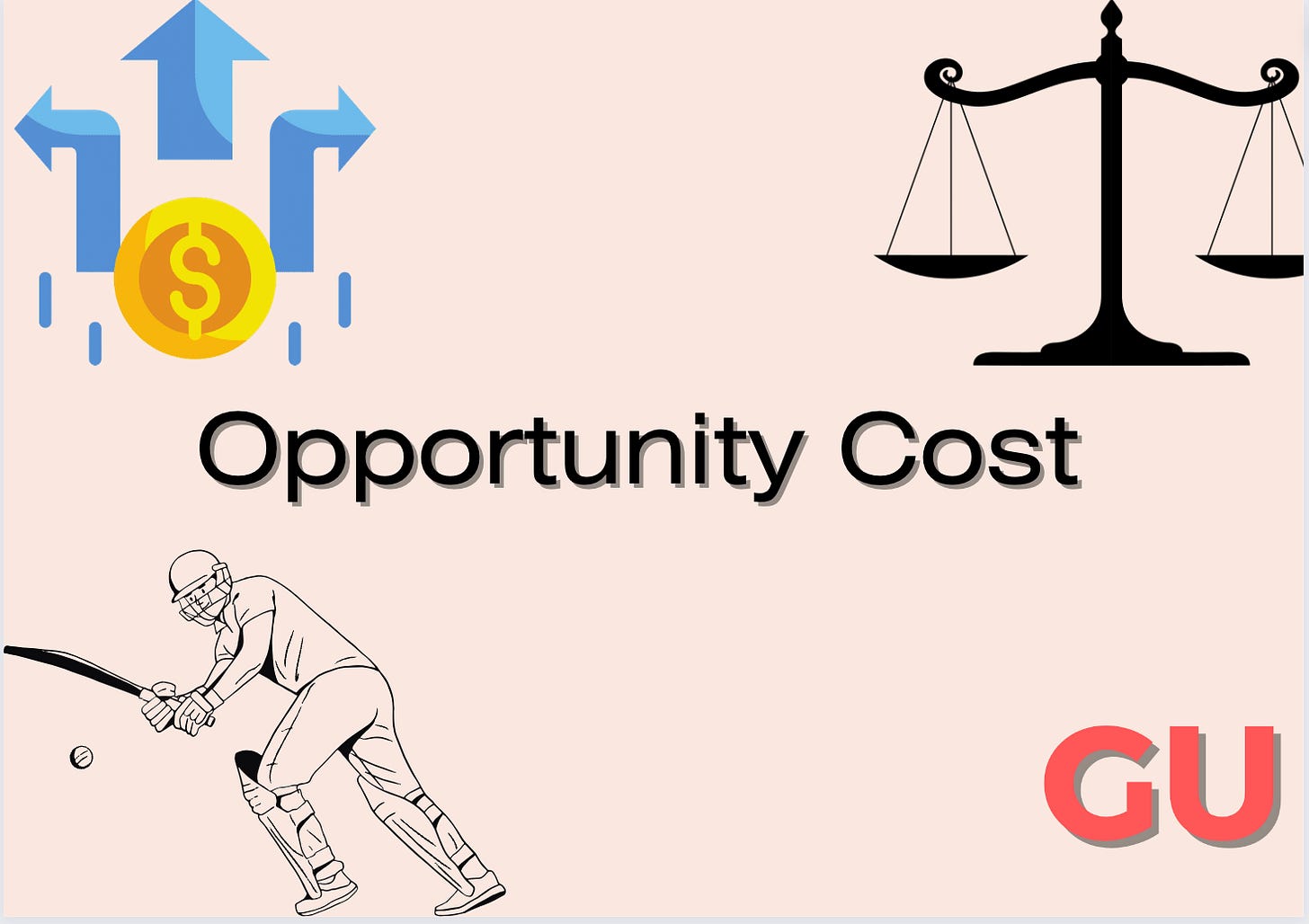Hi there!
Reading time: About 5 minutes
Quote
"Give yourself a lot of shots to get lucky' is even better advice than it appears on the surface. Luck isn’t an independent variable but increases super-linearly with more surface area—you meet more people, make more connections between new ideas, learn patterns, etc." ~ Sam Altman
Mental Model
Opportunity Cost
Opportunity cost is a mental model that comes from the discipline of economics.
Sometime ago I was presented with a lot of options. I could have either stayed at home and taken a drop year or I could have joined a college in Pune. I ended up joining the college in Pune even though initially I did not want to leave my home town and at the same time cricket.
It’s been over a year now since I have joined this college and I have learnt a lot and personally grown. In my opinion even though I did not feel like I was making the right decision at the time I feel it is a good decision.
What if I didn’t join the college in Pune?
Well I probably would stay at home playing cricket and enjoying life as well, the only difference I think would have been in my knowledge growth and personal growth.
Now that we have seen the two opportunities I was presented with and the one I chose. The opportunity that I left behind in Mumbai is my opportunity cost.
In a world where we are spoiled with choices there will always be trade offs. By choosing one thing you are giving up on all the other things which is your opportunity cost.
In Sports
As an amateur cricket player I can tell you that I have made many choices which have had a high opportunity cost which could have changed my career trajectory massively. As a cricketer you decide what you have to train as whether it is as a batsman, a bowler, a wicketkeeper or an allrounder. Now that is all fine as the more you play the sport the more evident it becomes as to what you are good at. The opportunity cost problem after this comes in the way you train. One is to trust your natural talent and a little bit of hard work. The other is to work as hard as you can regardless of your talent. In the second method of training you train as a proper athlete with a proper mindset.
You have big dreams. That does not matter because everyone has those big dreams. What matters is the way you work for it. In sport whatever effort you put the results are shown on the ground. I don’t know a single person who hasn’t worked their ass off to reach a higher level than me.
Eventually the dreamers who only dream realise they have lost a lot of time half assing something that cannot be half assed. You would have been better off doing one thing with pure focus rather than two things with no focus whatsoever.
This is an opportunity cost of every sportsman. They think the safer way will be the right way. But the opportunity cost is their dream just being a dream.
In Investing
Opportunity cost as I look at it is kind of like an error of omission. An error of omission is the mistakes that we cannot see investors make as they don’t show up on your returns. For instance, me not buying a great company like Amazon, even when I should have is an opportunity cost. Now this does not show up as a mistake on my P&L as I did not lose any money on the investment.
“Opportunity cost is a huge filter in life. If you've got two suitors who are really eager to have you and one is way the hell better than the other, you do not have to spend much time with the other. And that's the way we filter out buying opportunities.” ~ Munger
I mean naturally when you invest in a company you are not investing in something else so your opportunity cost will always be there. In my opinion though, opportunity cost in investing is not as important.
Let’s see why,
(Pulak Prasad wrote something similar in his book so I suggest you read it.) There are two types of errors, errors of commission and errors of omission. In Investing an error of commission comes at you big time it hampers your return. An error of omission is probably due to some factors in the company working out which did not fit your checklist. If that is the case you should have no regrets. When you pick the type of investor you want to be you have to be fine letting go of winners which do not come into the category that you want to buy.
For example, if I am an investor who does not like companies with high valuations when I enter businesses or I do not like fast changing technological companies as they cannot be predicted and their moats are not stable. If this is the case then I should be fine letting go of Tesla, Asian Paints,etc. because the way I want to invest does not match the stocks.
In this case while your opportunity cost is high it should be perfectly fine because you would rather miss out on a successful company which has a low odd of success than buy something and lose money.
Just a personal take.
Still important to understand the opportunity cost every time we buy or sell our businesses. Especially as a retail investor. We have limited capital.
Interesting find
That’s it for this week!
Enjoy your weekend!




